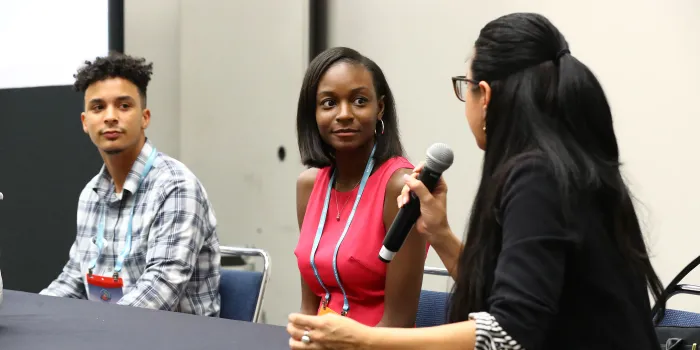Ask a Social Worker is a monthly column featuring questions from the community and answers from members of NHF’s Social Work Working Group. If you have questions for our social workers, send them to [email protected].
Dear Amanda,
I am interested in attending the Bleeding Disorders Conference for the first time. What’s holding me back is my major social anxiety. How can I make myself comfortable and confident in a new setting?
First, feeling anxious about attending a large conference is completely normal. You are not alone!
In addition to typical social anxiety, we are all practicing reintegrating into society after the pandemic. Trying to navigate new social situations can feel overwhelming. There are many contributing factors to social anxiety. If we are worried about how people perceive us or that a situation won’t go well, we are likely to feel anxious and avoid the situation altogether.
Here are some strategies that may help:
Practice Engaging in Social Experiences
Start small. Build your confidence by trying to engage in small-scale social situations before jumping into the Bleeding Disorders Conference (BDC). Look into local chapter events, or even plan a small get-together with friends.
Make Social Goals for Yourself
Try the PRAMS model for setting goals for yourself:
- Personal: The goal should be important to you.
- Realistic: It needs to be possible.
- Achievable: Start small so you aren’t overwhelmed.
- Measurable: It needs to be easy to assess. (Instead of “make plans with friends,” try “socialize with friends twice a month outside your house.”)
- Specific: The goal needs to be as clear as possible in order to track progress.
Keep a Journal to Monitor Your Progress
Monitor how you feel in certain social situations. Try using a scale of 1 to 10, with 1 meaning you feel the calmest and 10 meaning you’re the most anxious. You can write down your number before and after the social experience. Reflect on why your numbers weren’t higher or lower. This skill can help you better evaluate what is making you anxious and how your thoughts and feelings can change. It can also help reveal automatic negative thoughts you have about yourself and the world.
Try Relaxation Techniques Such as Deep Breathing or Grounding Exercises
Anxiety often manifests physically. Have you ever found yourself with a rapid heartbeat, tummy distress, or sweating when feeling overwhelmed? It’s important to try to manage the physical symptoms of anxiety so they can pass more easily. Take a few deep breaths or use grounding techniques. This can be as simple as naming three things in the room around you. Grounding techniques help you stay present in the here and now so you aren’t worrying about the future.
Talk with Someone Who Has Attended BDC in the Past
Not knowing what to expect in a situation can cause distress. The blood and bleeding disorders community is full of people who want to help and would be willing to share their experiences from past conferences so you can prepare for what it will be like. You can always reach out to your hemophilia treatment center social worker or local chapter to help prepare yourself for a major event.
— Amanda Stahl, MSW, LICSW
Stahl works at the Boston Hemophilia Center at Brigham and Women’s Hospital and is a member of the Social Work Working Group.

